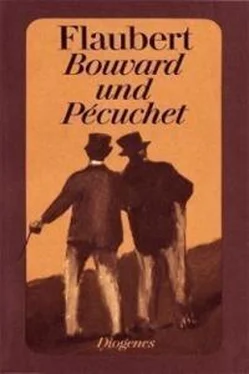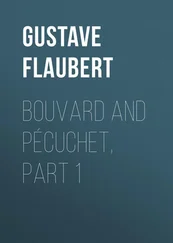"Poor woman!" said Madame Bordin.
After this they begged of her to choose a piece for them.
She felt perplexed about making a selection. She had seen only three pieces: Robert le Diable in the capital, Le Jeune Mari at Rouen, and another at Falaise which was very funny, and which was called La Brouette du Vinaigrier . [10] The Vinegar Merchant's Wheelbarrow.
Finally, Bouvard suggested to her the great scene of Tartuffe in the second act.
Pécuchet thought an explanation was desirable:
"You must know that Tartuffe―"
Madame Bordin interrupted him: "We know what a Tartuffe is."
Bouvard had wished for a robe for a certain passage.
"I see only the monk's habit," said Pécuchet.
"No matter; bring it here."
He reappeared with it and a copy of Molière.
The opening was tame, but at the place where Tartuffe caresses Elmire's knees, Pécuchet assumed the tone of a gendarme:
" What is your hand doing there? "
Bouvard instantly replied in a sugary voice:
" I am feeling your dress; the stuff of it is marrowy. "
And he shot forth glances from his eyes, bent forward his mouth, sniffed with an exceedingly lecherous air, and ended by even addressing himself to Madame Bordin.
His impassioned gaze embarrassed her, and when he stopped, humble and palpitating, she almost sought for something to say in reply.
Pécuchet took refuge in the book: " The declaration is quite gallant. "
"Ha! yes," cried she; "he is a bold wheedler."
"Is it not so?" returned Bouvard confidently. "But here's another with a more modern touch about it." And, having opened his coat, he squatted over a piece of ashlar, and, with his head thrown back, burst forth:
"Your eyes' bright flame my vision floods with joy.
Sing me some song like those, in bygone years,
You sang at eve, your dark eye filled with tears." [11] Des flammes de les yeux inonde ma paupière. Chante–moi quelque chant, comme parfois, le soir, Tu m'en chantais, avec des pleurs dans ton oeil noir.
"That is like me," she thought.
"Drink and be merry! let the wine–cup flow:
Give me this hour, and all the rest may go!" [12] Soyons heureux! buvons! car la coupe est remplie, Car cette heure est à moi, et le reste est folie!
"How droll you are!" And she laughed with a little laugh, which made her throat rise up, and exposed her teeth.
"Ah! say, is it not sweet
To love and see your lover at your feet?" [13] N'est–ce pas qu'il est doux D'aimer, et savoir qu'on vous aime à genoux?
He knelt down.
"Finish, then."
"'Oh! let me sleep and dream upon thy breast,
My beauty, Doña Sol, my love!' [14] Oh! laisse–moi dormir et rêver sur ton sein, Doña Sol, ma beauté, mon amour!
"Here the bells are heard, and they are disturbed by a mountaineer."
"Fortunately; for, but for that―" And Madame Bordin smiled, in place of finishing the sentence.
It was getting dark. She arose.
It had been raining a short time before, and the path through the beech grove not being dry enough, it was more convenient to return across the fields. Bouvard accompanied her into the garden, in order to open the gate for her.
At first they walked past the trees cut like distaffs, without a word being spoken on either side. He was still moved by his declamation, and she, at the bottom of her heart, felt a certain kind of fascination, a charm which was generated by the influence of literature. There are occasions when art excites commonplace natures; and worlds may be unveiled by the clumsiest interpreters.
The sun had reappeared, making the leaves glisten, and casting luminous spots here and there amongst the brakes. Three sparrows with little chirpings hopped on the trunk of an old linden tree which had fallen to the ground. A hawthorn in blossom exhibited its pink sheath; lilacs drooped, borne down by their foliage.
"Ah! that does one good!" said Bouvard, inhaling the air till it filled his lungs.
"You are so painstaking."
"It is not that I have talent; but as for fire, I possess some of that."
"One can see," she returned, pausing between the words, "that you—were in love—in your early days."
"Only in my early days, you believe?"
She stopped. "I know nothing about it."
"What does she mean?" And Bouvard felt his heart beating.
A little pool in the middle of the gravel obliging them to step aside, they got up on the hedgerow.
Then they chatted about the recital.
"What is the name of your last piece?"
"It is taken from Hernani , a drama."
"Ha!" then slowly and as if in soliloquy, "it must be nice to have a gentleman say such things to you—in downright earnest."
"I am at your service," replied Bouvard.
"You?"
"Yes, I."
"What a joke!"
"Not the least in the world!"
And, having cast a look about him, he caught her from behind round the waist and kissed the nape of her neck vigorously.
She became very pale as if she were going to faint, and leaned one hand against a tree, then opened her eyes and shook her head.
"It is past."
He looked at her in amazement.
The grating being open, she got up on the threshold of the little gateway.
There was a water–channel at the opposite side. She gathered up all the folds of her petticoat and stood on the brink hesitatingly.
"Do you want my assistance?"
"Unnecessary."
"Why not?"
"Ha! you are too dangerous!" And as she jumped down, he could see her white stocking.
Bouvard blamed himself for having wasted an opportunity. Bah! he should have one again—and then not all women are alike. With some of them you must be blunt, while audacity destroys you with others. In short, he was satisfied with himself—and he did not confide his hope to Pécuchet; this was through fear of the remarks that would be passed, and not at all through delicacy.
From that time forth they used to recite in the presence of Mélie and Gorju, all the time regretting that they had not a private theatre.
The little servant–girl was amused without understanding a bit of it, wondering at the language, charmed at the roll of the verses. Gorju applauded the philosophic passages in the tragedies, and everything in the people's favour in the melodramas, so that, delighted at his good taste, they thought of giving him lessons, with a view to making an actor of him subsequently. This prospect dazzled the workman.
Their performances by this time became the subject of general gossip. Vaucorbeil spoke to them about the matter in a sly fashion. Most people regarded their acting with contempt.
They only prided themselves the more upon it. They crowned themselves artists. Pécuchet wore moustaches, and Bouvard thought he could not do anything better, with his round face and his bald patch, than to give himself a head à la Béranger. Finally, they determined to write a play.
The subject was the difficulty. They searched for it while they were at breakfast, and drank coffee, a stimulant indispensable for the brain, then two or three little glasses. They would next take a nap on their beds, after which they would make their way down to the fruit garden and take a turn there; and at length they would leave the house to find inspiration outside, and, after walking side by side, they would come back quite worn out.
Or else they would shut themselves up together. Bouvard would sweep the table, lay down paper in front of him, dip his pen, and remain with his eyes on the ceiling; whilst Pécuchet, in the armchair, would be plunged in meditation, with his legs stretched out and his head down.
Читать дальше








![Гюстав Флобер - Закат Карфагена [Сборник]](/books/414440/gyustav-flober-zakat-karfagena-sbornik-thumb.webp)


